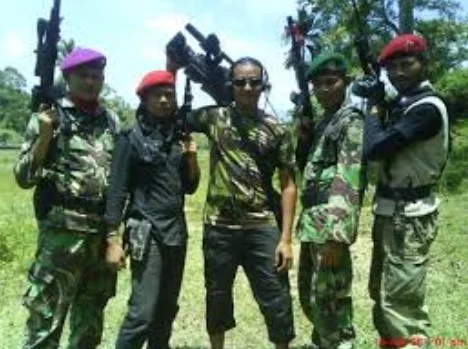Angen Badee Ba: A Film and a Director Repressed by the Indonesian Military
by Akbar Rafsanjani
Films can be more dangerous than political movements. They create subjective truths in every audience. Film and the military are two topics that often intersect, especially in Southeast Asia. Film is used by military regimes as propaganda and it can be used as a weapon that attacks the military itself. Military officials understand the power of film. In Indonesia, the film Pengkhianatan G30S PKI was the most successful propaganda film for decades, promoting Suharto’s regime.
Aceh, in the west of Indonesia, has been the site of long-running conflicts in the region, starting when the Portuguese fleet was expelled from the Malacca Straits, followed by a war with Dutch colonialists, and then with the Japanese during WWII. The Darul Islam militia was established after that war, and they demanded independence from the Republic of Indonesia. In these times, cinema in Aceh could not develop and production was virtually nil. Only when the film entitled Tjoet Nja’ Dhien (1988) was made was there finally a breath of fresh air, but there was no real progress after that.
Peace in Aceh began with the signing of a Memorandum of Understanding between the Free Aceh Movement (Gerakan Aceh Merdeka /GAM) and the Republic of Indonesia. GAM is a movement led by Hasan Tiro, who demanded Aceh’s independence from the Republic of Indonesia. This movement was proclaimed on December 4 1976, and after that an armed conflict between GAM and the Indonesian National Army lasted until August 15 2005. This long war in Aceh resulted in tremendous losses, which impacted on the development of the country and the fields of creativity and art.
Production crew of Angen Badee Ba (Courtesy Teuku Emi)
In 2009, four years after the signing of the MoU in Helsinki, a former GAM member, Teuku Emi, produced a film entitled Angen Badee Ba (Weep by the Storm) under his own production house, EE Production. Angen Badee Ba tells the story of a battle between a group of GAM under the leadership of Abu Salam and a battalion of TNI (The Indonesian army). Teuku Emi was previously a member of Cut Meutia studio in North Aceh. This studio gave birth to many successful artists such as Herman, one of the guitarists from the Seventeen (a music group in Indonesia). Through this film, Teuku Emi wanted to show that the war in Aceh was detrimental and useless. There were several scenes that show the human side of the TNI and GAM; they buried their dead opponents humanely, and underwent religious obligations.
This one-hour film was the first fictional work in Aceh to tell stories about this long war. In making this film, Teuku Emi was not on any side. He just wanted to create an artwork that was an invitation to not repeat armed conflict in Aceh ever again. According to him (and he had experienced the war himself as a member of GAM), this war claimed many casualties from both civilian and the military. The film ends with gratitude for the news of the signing of the MoU.
For the production of the film Angen Badee Ba, help was received for the wardrobe in the form of TNI uniforms from the North Aceh Military District Commander, Mr. Yogi Gunawan, who was also Teuku Emi’s best friend, on the other side of the conflict. Teuku Emi used toy guns and fireworks to create his effects. The film was shot in Tangse, Pidie district, in three villages, namely: Blang Rimeh, Pulo Seunong, and Jambo Badeuk, which had indeed been a battleground between GAM and the TNI. During the shooting process, Teuku Emi and the crew did not receive any special security.
The film was distributed on Video Compact Disc (VCD) throughout Aceh. In the first printing, the film sold up to 400,000 pieces of VCD, according to the director. However, unpredictable events occurred. One night, Teuku Emi got information about a plan for his kidnapping by a group of people assumed to be members of the TNI. On December 24 2009, he escaped by going to Medan (North Sumatra) and proceeding to Jakarta. He wanted to protect Yogi Gunawan by making himself the guilty party. However, the film was banned and Yogi Gunawan was imprisoned, accused of having given the uniforms of the Indonesian National Army to the film without permission from the Commander of the Military Regional Command, Mr. Soenarko.
The film became even more famous. Some distributors in Aceh even called Teuku Emi to ask permission to pirate the film and sell it secretly through the ice cream sellers and city transport drivers for a price of around Rp. 20,000 for every VCD. The director believes that the film eventually sold over one million copies, as it spread throughout Aceh, and other parts of Indonesia.
Teuku Emi did not feel safe in Jakarta, and applied for political asylum in Australia, where he lives today.
After the MoU, there was still no guarantee of the safety of the artists who tried to express themselves by producing films that talked about the war. The issue of power struggles among the military elite in Aceh led to repressive treatment of the film Angen Badee Ba and its director. This film is now historical evidence of military control over both film and ideology in Indonesia.
Angen Badee Ba, like the literal meaning of the title, is completely gone in the wind. Young filmmakers and even academics and film reviewers in Aceh have never heard the repressive stories about this film. Art and artists are still considered demons who are able to overthrow the power of leaders. Therefore, repressive actions against artists and art, including filmmakers and films, will continue to occur, especially in Aceh.
Akbar Rafsanjani works as a programmer for the Aceh Film Festival and for the alternative film venue Aceh Menonton. He is also a researcher at the Research and Development department of the Aceh Documentary Foundation.

